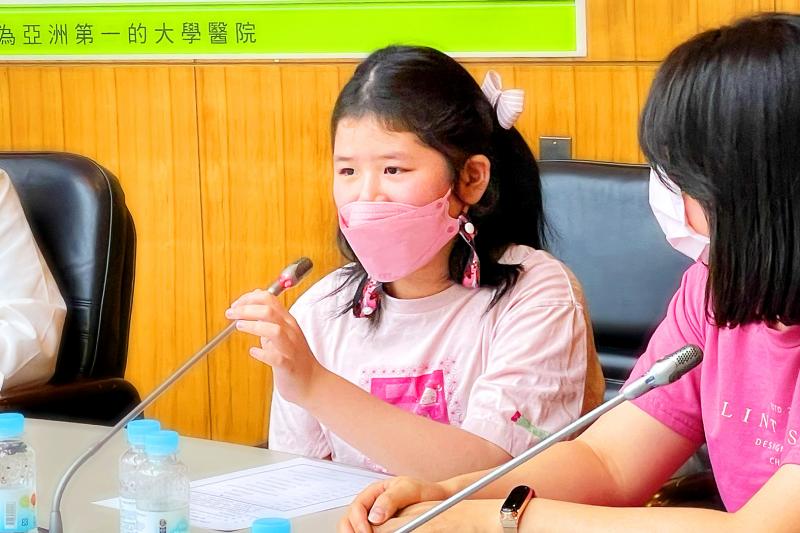A 10-year-old girl who has been battling leukemia for more than four years has become the first person in Taiwan to be successfully treated with a new form of immunotherapy, doctors at National Taiwan University Hospital (NTUH) said yesterday.
The child, identified only as Ting-ting (亭亭), was diagnosed with pediatric B-cell acute lymphoblastic leukemia at the age of six and was initially receiving targeted chemotherapy, her doctors told a news conference.
When her leukemia recurred last year, doctors recommended the CD19 chimeric antigen receptor (CAR) T-cell therapy — a immunotherapy treatment that was introduced in the past decade and had never previously been used successfully to treat a person with leukemia in Taiwan.

Photo: Chiu Chih-jou, Taipei Times
After an infusion of CD19 CAR T-cells in April, Ting-ting’s cancer went into complete remission, the doctors said, adding that she was recently able to spend her 10th birthday at home with her family.
CAR T therapies became prominent in 2012, when they were successfully used in a clinical trial to treat Emily Whitehead, a six-year-old American girl who had been diagnosed with leukemia.
In such therapies, immune cells called T-cells are taken from a patient’s blood and modified by adding a gene for a CAR, which helps them attach to the specific cancer cell antigen. They are then put back in the patient.
Ting-ting’s mother recalled the difficulty she had in explaining the cancer diagnosis to such a young child, telling the news conference that she eventually told her daughter it was “like having a cold” and would get better if she took her medicine.
She thanked her daughter’s medical team for discussing with her the option of CAR T-cell therapy, which she said allowed them to begin the treatment as soon as Ting-ting’s cancer recurred.
Cancer is the second-leading cause of death among children in Taiwan and leukemia accounts for a significant proportion, said Lee Wang-tso (李旺祚), director of NTUH’s Department of Pediatrics.
In the past, the options for treating pediatric leukemia have been limited mainly to chemotherapy, which can cause adverse reactions, and bone marrow transplants, which are difficult to arrange and sometimes require the patient to take immunosuppressant drugs indefinitely, Lee said.
Jou Shiann-tang (周獻堂), a doctor in the hospital’s Department of Hematology and Oncology, said that about 500 new pediatric leukemia cases are diagnosed in Taiwan each year.
About one-quarter of them are acute lymphoblastic leukemia and about 15 percent of such patients have adverse reactions to treatment or the cancer recurs, Jou said.
Ting-ting’s parents said that the CD19 CAR T-cell therapy has the potential to help other children.
However, the treatment is not covered by the National Health Insurance, which meant that they had to sell their home to pay the NT$10 million (US$334,571) it cost.
The National Health Insurance Administration is reviewing whether to cover such treatments in the future, the hospital said.

Global bodies should stop excluding Taiwan for political reasons, President William Lai (賴清德) told Pope Francis in a letter, adding that he agrees war has no winners. The Vatican is one of only 12 countries to retain formal diplomatic ties with Taiwan, and Taipei has watched with concern efforts by Beijing and the Holy See to improve ties. In October, the Vatican and China extended an accord on the appointment of Catholic bishops in China for four years, pointing to a new level of trust between the two parties. Lai, writing to the pope in response to the pontiff’s message on Jan. 1’s

A Vietnamese migrant worker on Thursday won the NT$12 million (US$383,590) jackpot on a scratch-off lottery ticket she bought from a lottery shop in Changhua County’s Puyan Township (埔鹽), Taiwan Lottery Co said yesterday. The lottery winner, who is in her 30s and married, said she would continue to work in Taiwan and send her winnings to her family in Vietnam to improve their life. More Taiwanese and migrant workers have flocked to the lottery shop on Sec 2 of Jhangshuei Road (彰水路) to share in the luck. The shop owner, surnamed Chen (陳), said that his shop has been open for just

TAKE BREAKS: A woman developed cystitis by refusing to get up to use the bathroom while playing mahjong for fear of disturbing her winning streak, a doctor said People should stand up and move around often while traveling or playing mahjong during the Lunar New Year holiday, as prolonged sitting can lead to cystitis or hemorrhoids, doctors said. Yuan’s General Hospital urologist Lee Tsung-hsi (李宗熹) said that he treated a 63-year-old woman surnamed Chao (趙) who had been sitting motionless and holding off going to the bathroom, increasing her risk of bladder infection. Chao would drink beverages and not urinate for several hours while playing mahjong with friends and family, especially when she was on a winning streak, afraid that using the bathroom would ruin her luck, he said. She had

MUST REMAIN FREE: A Chinese takeover of Taiwan would lead to a global conflict, and if the nation blows up, the world’s factories would fall in a week, a minister said Taiwan is like Prague in 1938 facing Adolf Hitler; only if Taiwan remains free and democratic would the world be safe, Deputy Minister of Foreign Affairs Francois Wu (吳志中) said in an interview with Italian newspaper Corriere della Sera. The ministry on Saturday said Corriere della Sera is one of Italy’s oldest and most read newspapers, frequently covers European economic and political issues, and that Wu agreed to an interview with the paper’s senior political analyst Massimo Franco in Taipei on Jan. 3. The interview was published on Jan. 26 with the title “Taiwan like Prague in 1938 with Hitler,” the ministry